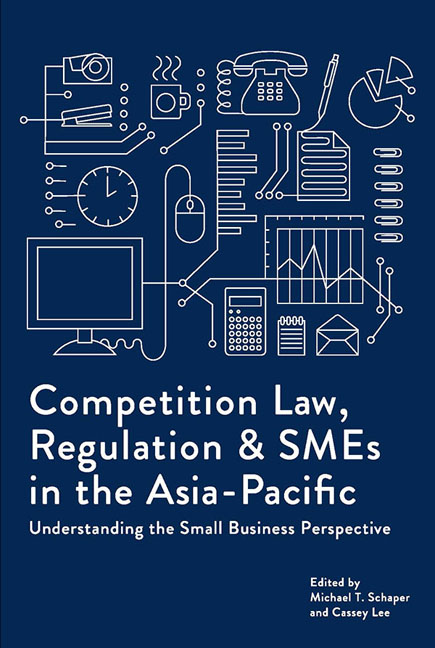 Competition Law, Regulation and SMEs in the Asia-Pacific
Competition Law, Regulation and SMEs in the Asia-Pacific Book contents
- Frontmatter
- Contents
- Foreword
- About the Contributors
- 1 Introduction: Making the Invisible SME More Visible in Competition Policy and Law
- Section 1 Theories And Basic Concepts
- Section 2 Smes And Competition Law
- 7 The Application of Per Ses to Smes: The Type 1 Error No One Notices?
- 8 Enforcing Competition Law Against SMEs: Presumptions and Problems
- 9 How Competition Law May Affect Franchised Smes in Apec Economies
- 10 Chinese Family Firms in Southeast Asia: Special Problems for Competition Law?
- 11 Trade Associations: Competition Law Advocates or Offenders?
- Section 3 Country Studies
- Index
7 - The Application of Per Ses to Smes: The Type 1 Error No One Notices?
from Section 2 - Smes And Competition Law
Published online by Cambridge University Press: 05 August 2017
- Frontmatter
- Contents
- Foreword
- About the Contributors
- 1 Introduction: Making the Invisible SME More Visible in Competition Policy and Law
- Section 1 Theories And Basic Concepts
- Section 2 Smes And Competition Law
- 7 The Application of Per Ses to Smes: The Type 1 Error No One Notices?
- 8 Enforcing Competition Law Against SMEs: Presumptions and Problems
- 9 How Competition Law May Affect Franchised Smes in Apec Economies
- 10 Chinese Family Firms in Southeast Asia: Special Problems for Competition Law?
- 11 Trade Associations: Competition Law Advocates or Offenders?
- Section 3 Country Studies
- Index
Summary
In this chapter, we consider the impact of per se laws on small and mediumsized enterprises (SMEs). Drawing on Australia's unusual adjudication/ enforcement model, we assess SMEs’ use of legitimate mechanisms designed to avoid overreach of the per se prohibitions, as well as the enforcement of those prohibitions against SMEs. These measures provide a basis for comparing compliance and non-compliance by small business and their larger counterparts.
Our analysis demonstrates that SMEs hardly ever attract regulatory attention for potentially lessening competition. Yet, in Australia, they feature in almost 50 per cent of per se proceedings, and are responsible for almost 80 per cent of matters resolved via (non-judicial) undertakings. At the same time, SMEs are under-represented as users of Australia's statutory immunity processes. These factors combine to suggest that per se prohibitions impose a competitive hindrance which disproportionately affects SMEs as against larger businesses.
In designing competition laws, therefore, one must be wary of an overzealous approach to per se prohibitions. If, as the Australian experience suggests, there is little or no prospect that conduct by SMEs will give rise to a “pernicious effect on competition”, then the law should be slow to impose conclusive presumptions to the contrary.
Introduction
“The true test of legality is whether the restraint imposed is such as merely regulates and perhaps promotes competition or whether it is such as may suppress or even destroy competition.” (Justice Brandeis, Chicago Board of Trade vs United States 1918)
Small and medium-sized enterprises (SMEs) are the heartbeat of the modern economy. Despite increasing corporatization and globalization, they remain responsible for most economic growth and innovation — indeed former U.S. President Ronald Reagan observed, “Entrepreneurs and their small enterprises are responsible for almost all the economic growth in the United States” (Reagan 1988). For all their economic significance, however, SMEs tend to be treated as the “exception” rather than the rule when it comes to competition laws.
In this chapter, the appropriateness of per se laws for SMEs is examined, remembering that:
The rationale for per se rules is to avoid a burdensome inquiry into actual market conditions in situations where the likelihood of anticompetitive conduct is so great as to render unjustified the costs of determining whether the particular case at bar involves anticompetitive conduct (Jefferson Parish Hospital District No. 2 vs Hyde 1984).
- Type
- Chapter
- Information
- Competition Law, Regulation and SMEs in the Asia-PacificUnderstanding the Small Business Perspective, pp. 123 - 142Publisher: ISEAS–Yusof Ishak InstitutePrint publication year: 2016


